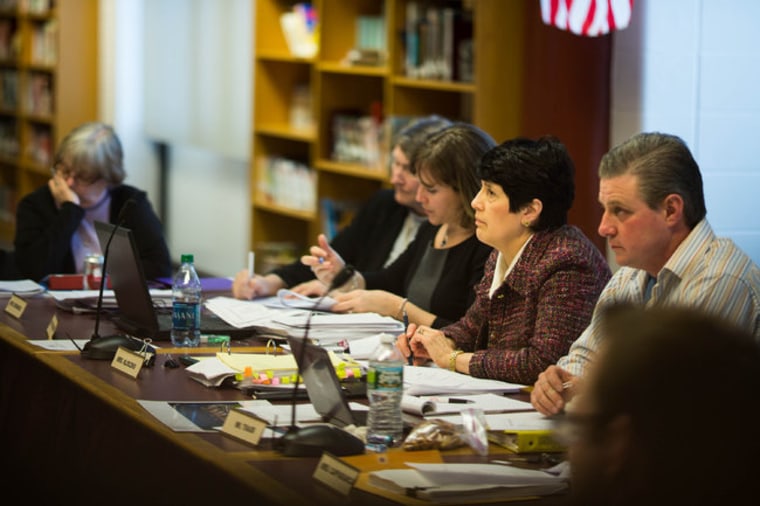Two 18-year-old high school football players had been arrested, accused of the statutory rape of two 13-year-old girls. Their friends then rallied to their defense, attacking the girls on Twitter. And so, when the Twitter posts brought national condemnation to this old mill town, the principal of Torrington High School decided it was time to appeal to her students’ better natures.
In her note on March 22, the principal, Joanne R. Creedon, urged the students to “get that spotlight on the good.” Among other student-sponsored good deeds, she said, the Interact Club was holding a dodgeball tournament for charity that Friday. “Come out for one of these events, have fun, and show everyone what T.H.S. is really about,” she wrote.
The dodgeball tournament seemed to go off without a hitch. But the next Monday, the winning team appeared in a picture on the front page of The Register Citizen, the local newspaper — extending their fingers in 2’s and 1’s, for the “21” on the football jersey of one of the accused players, Edgar Gonzalez, who remains in jail.
The paper had found the photo on Instagram. Someone had posted it with a label: #FreeEdgar.
The older residents of Torrington, a city of 36,000 in northwestern Connecticut bypassed by economic recovery, would like their town to be known for its middle-class values, for the way people lend a hand to their neighbors. But they have seemed helpless as Torrington has become synonymous with #FreeEdgar, the defiant Twitter hashtag that has come to stand for everything the teenagers believe is wrong with the arrests — and everything outsiders believe is wrong with the town.
When The Register Citizen published several teenagers’ Twitter messages defending Mr. Gonzalez and the other football player, Joan Toribio, both 18-year-old seniors, on March 20, a minor scandal became a town preoccupation. It brought unavoidable if rough comparisons to the rape case in Steubenville, Ohio, last year, where repeated violations of a teenage girl were chronicled in social media.
In the last two weeks, two 17-year-old boys were arrested, charged, like the 18-year-olds, with sexual assault involving 13-year-old girls. All along, social media have continued to buzz, and Torrington’s parents and school officials have been left to play catch-up, trying to bridge a generational divide that has never felt so sharp here before.
Twitter accounts normally used to complain about homework, to chatter and to flirt were instead used to accuse the girls of “destroying” the young men’s lives. “Snitch,” they called one girl, asking why only the male students were being prosecuted if she, too, said yes to having sexual relations. Some people worry that the two girls, who were sending Twitter messages back and forth and to the young men until early February, not long before the first arrests, have seen the messages about them.
“Young girls acting like whores there’s no punishment for that,” one student posted the day after Mr. Gonzalez’s arrest on Feb. 20, continuing, “young men acting like boys is a sentence."
Many adults in the community have been aghast at the posts, particularly those attacking the girls. They also have expressed frustration that many teenagers do not understand the statutory rape law, which is predicated on the notion that juveniles are not mature enough to consent to sex with an older partner. The furor prompted Kenneth Traub, the Board of Education chairman, to convene a community forum on sexual assault, with members of the Police Department and sexual assault counselors.
“It’s a hard time in Torrington right now,” said Barbara Spiegel, executive director of the Susan B. Anthony Project, a center here for battered women and victims of sexual assault.
School officials have asked Ms. Spiegel’s counselors to meet with students, including those in the dodgeball photo, acknowledging that administrators must try to change teenagers’ attitudes without being able to regulate what they say online. At Torrington Middle School, where the two victims are in eighth grade, administrators also called an assembly to warn against online “name-calling.”
“It’s not completely uncharted territory, but it’s new,” Ms. Spiegel said. “A while back it was Myspace, and then it was Facebook, and then it was sexting, and now it’s Twitter.”

The school superintendent, Cheryl F. Kloczko, has urged parents to speak to their children, telling them that inappropriate posts can result in suspension or expulsion. But no students, Mr. Traub said, have yet gone before the board for a social-media-related expulsion hearing. (Mr. Traub said he did not know whether there had been any suspensions, and Ms. Kloczko declined to comment.)
Adding to the district’s challenges is that while there is plenty of speculation online about the statutory rape case, there is little official information. The police have said only that the arrests of Mr. Toribio and Mr. Gonzalez, both residents of a modest housing complex known as Highwoods, stemmed from separate episodes around Feb. 10; one of the victims’ parents reported an assault to the police on Feb. 11.
Mr. Toribio is free on $100,000 bond; his lawyer, Charles Brower, declined to comment. Mr. Gonzalez, who also faces several charges related to a March 2012 robbery, is being held at the New Haven Correctional Center. His lawyer, J. Patten Brown III, said he intended to fight the charges at trial.
Mr. Toribio, Mr. Gonzalez and the two 17-year-olds, whose names have not been disclosed because they are minors, face similar charges of risk of injury to a minor and second-degree sexual assault, which in Connecticut is defined as sex with someone who cannot legally consent to sex, like someone under 16. (The law makes an exception if those involved are less than three years apart.) The police have not said whether the arrests are related, only that there are two victims.
“The chick, she should get in trouble, too,” a high school sophomore, who declined to give his name, said in an interview outside the school last week. “It’s probably a regular thing she does. It wouldn’t surprise me.”
At times, adults in Torrington have struggled to grasp teenagers’ online habits as much as students have struggled to grasp the consequences of their posts. At one news conference, Ms. Kloczko broke into tears, saying that while the district tried to teach students moral behavior, “sometimes it seems that just isn’t enough.”
Mr. Traub said he believed that the Twitter messages were posted “just to get a reaction.”
“I put no weight in any comments made online,” he said. “I don’t believe in Twitter. I don’t believe in Facebook. I don’t think that 13-year-olds should spend as much time online as they do.”
In the middle of the controversy is The Register Citizen, which has strived since 2010 to welcome the community into its newsroom, inviting local residents to participate in daily news meetings, but now finds itself both scolding that community and defending its coverage of it.
In editorials, the newspaper has admonished that “ ‘statutory’ rape is rape” and “rape is not O.K.,” and called for tighter controls on bullying, positions many readers have cheered. It also published “15 good things about Torrington High School” after students accused it of drawing undue negative attention to the school. Several students and parents complained when the newspaper published teenagers’ Twitter handles and messages — a move the editor, John Berry, said “helped stress that people couldn’t turn around and say, ‘It’s not my kids.’ ”
Jessica Glenza, the lead reporter on the coverage of the cyberbullying of the girls, said people had asked whether she had searched for offensive Twitter posts that could tie the case to the rape in Steubenville.
“No, because who would expect to find something like that?” she said. “No one would.”
Since then, several Twitter accounts that used the #FreeEdgar hashtag have been shut down or made private. But the 13-year-old girls are still posting. They write about school, movies, friends and, once in a while, about sadness.
This story, "," first appeared in The New York Times.
